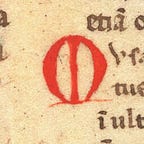Trinity College MS O.2.48 — Herba Yacobieth
Cambridge, Trinity College MS O.2.48 is a herbal which, according to Maria Amalia D’Aronco, was written in Southern Italy and dates to the XIII or XIV Century (“Gardens on Vellum”, in “Health and Healing from the Medieval Garden” 2008, Peter Dendle and Alain Touwaide ed.). Rene Zandbergen has mentioned the manuscript on the Voynich.ninja forum. MS O.2.48 contains a copy of the herbal and bestiary known as “Pseudo-Apuleius”. It also contains a larger collection of unidentifiable plants with unique descriptions and illustrations. This section of the work contains frequent references to magic and appears to be somehow similar to the Alchemical Herbal (whose earliest exemplar is Bodley MS. Canon. Misc. 408, Milan, Italy, 1378).
Some pages of the manuscript have been previously transcribed and translated on viridisgreen.
What follows is another magical plant whose illustration features anthropomorphic and zoomorphic elements. The description of the plant occupies the bottom of f243r and the top of f243v.
Transcription:
Nomen herbe “yacobieth”, Graeci “lakir”, / Ebrayci “sudem”. Nascitur in India Minore. / Tenens [?] ramos rectos, violaceos, habens in summo unum / folium latum, roxum, cum flosellis [?] violaceis super / folia ornatum, et cum maculis / croceis. Flores vero similia sunt / capita sacerdoti, violaceis cum flosellis violaceis inter me- / dium. Radicem vero [?] / formata in modo scorpionis. Sine semine est. Tota redolens /ut gariofila. Radix vero super se / portata omnes venenos effugat. Herba vero super se portata vel flores ab omnibus / est dilectus. Et si quis eam in manu dextera / habuit non possit videri ab aliis dum in manu / habuit. Ipsa herba circa 2 drachmae potui datur / [f243v] [contra?] dolorem in corpore vel guta folio super tibi / […] sanat. Ipsa sola ad collum gestata / numquam ab aliquo potest superari. Et / si aliquid ab aliquo vis impe- / trari, non possit tibi / denegare et faciet / quidquid volueris. Et, si quamdam [?]| mulierem vel hominem ex ea tetigeris, / mox ad servitium erit vehemens [?]. / Iste flos dum sol aperit ipse aperit / Et […] Salomon sine virtute / huius herbe contra magicam artem / nichil agebat. Lege eam cum […].
Translation:
The plant is called “yacobieth”; in Greek, “lakir”; in Hebrew “sudem”. It grows in Lesser India. It has straight purple stems, having on the top a single large red leaf which is adorned by small purple flowers and has yellow spots. Truly, its flowers are similar to priest heads; they are purple and with small purple flowers between them. Truly, its root has the shape of a scorpion. It has no seeds. It all smells like cloves. Truly, if one wears its root upon himself he will be protected against all poisons. Truly, if one wears the whole plant, or its flowers, upon himself, he will be loved by all. If one holds it in his right hand he will be invisible, as long as he holds it in his hand. About 2 drachmas of this plant can be given to drink against body pains. It heals gout if one wears [?] the leaf upon himself. If you wear it alone at your neck, you cannot be surpassed by anyone. If you want to ask anything to anybody, they cannot deny it and they will do whatever you want. If you touch with it a man or a woman, they will be soon ready to serve you with all enthusiasm. This flower opens when the sun is out. And Salomon did nothing against magical arts without the power of this plant. Collect it [whenever you want] [?].
